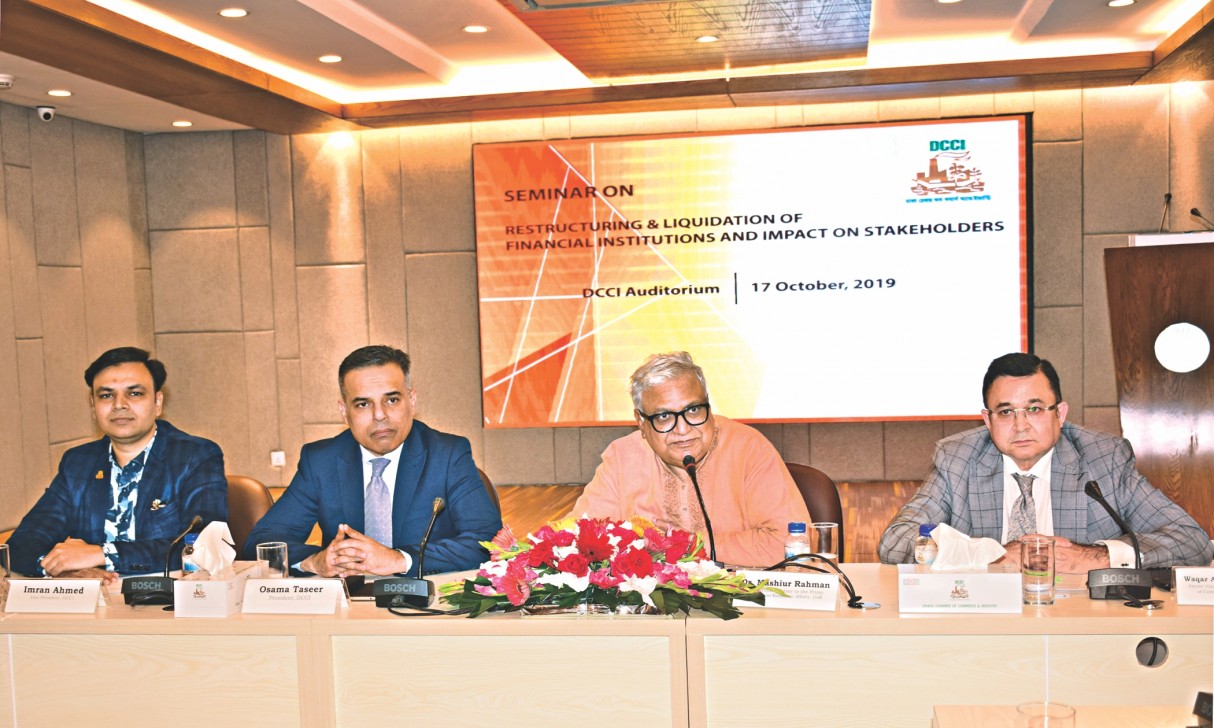Good governance needed for a disciplined financial sector

Policy reforms, good governance, and proper monitoring are required to help the country’s financial sector ride out the current crisis and put in place a sound system, analysts said yesterday.
They spoke at a seminar on “Restructuring & Liquidation of Financial Institutions and Impact on Stakeholders” at the Dhaka Chamber of Commerce & Industry (DCCI) on Thursday, according to a press release.
Mashiur Rahman, the prime minister’s adviser on economic affairs, called for policy reforms, modernisation and policy simplification for a strong financial market.
He recommended financial institutions conduct internal as well as external audits in a transparent manner on a regular basis.
Rahman also advised investors and depositors to invest and deposit their hard-earned money carefully.
“Our capital market does not have good shares. Besides, good companies don’t come to the share market to get listed, compelling investors to depend on the poor quality of shares to trade,” he said.
The adviser requested large companies to go public and called for more investment in the manufacturing sector.
Some institutional and policy reforms are needed to address the state of fragile financial institutions, said Osama Taseer, president of the DCCI.
Taseer said the financial sector was growing rapidly accompanied by a growing number of financial institutions, reforms for financial inclusion, product diversification and burgeoning volume of assets.
Despite remarkable improvement in the financial sector, some banks and financial institutions are facing crises and navigating through difficult times, he said.
“Institutional weakness, weak governance, a lack of stringent due diligence in loan disbursement, concentration of loans to large borrowers, and slow loan recovery process raised serious concern about the efficiency and soundness of many financial institutions.”
Taseer said the high amount of non-performing loans (NPLs) impacted the financial sector as well as the entire economy through slow credit recycling, creating a liquidity shortage.
Increasing deposit interest rate in turn increases lending rates, impacting private sector credit flow, he said.
“The Bangladesh Bank needs to strengthen its monitoring mechanism and early warning system to improve the financial health of weak financial institutions.”
Arif Khan, chief executive officer of IDLC Finance, in his keynote paper, suggested establishing a bond market and discouraging banks from going for long-term lending.
As banks take deposits for a one-year term, they should not go for long-term financing, he said.
In order to cut down NPLs, he stressed on good governance, strong monitoring by the central bank and ensuring penalties for wrong-doers.
Presenting another paper, Sohail RK Hossain, managing partner of RSA Consulting Partners, called for consolidating non-performing banks, giving Bangladesh Bank more freedom, restructuring weak financial institutions, increasing capital adequacy ratio and maintaining advance on deposit ratio to resolve the financial market’s crisis.
The speakers also called for proper monitoring, policy reforms, frequent auditing and selection of good borrowers for a disciplined financial market.
Mustafizur Rahman, a Supreme Court advocate, Minhaz Mannan Emon, a Dhaka Stock Exchange director, Md Kabir Ahmed, a BB general manager, and Md Abul Kalam, a Bangladesh Securities and Exchange Commission director, spoke as discussants.
DCCI Senior Vice-President Waqar Ahmad Choudhury, Vice-President Imran Ahmed and directors Akber Hakim, Ashraf Ahmed, Enamul Haque Patwary, KMN Manjurul Hoque, Md Al Amin and Shams Mahmud were also present.
